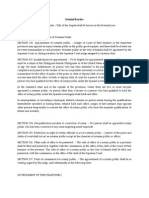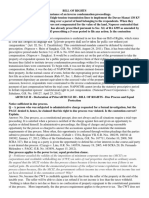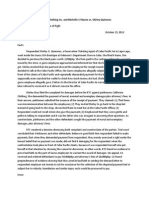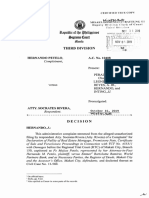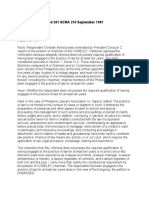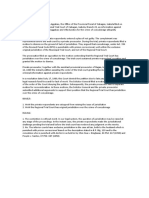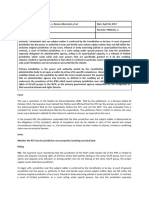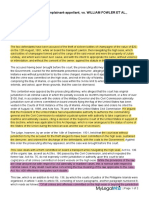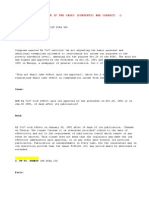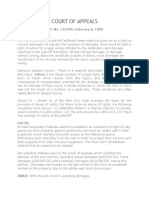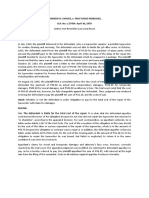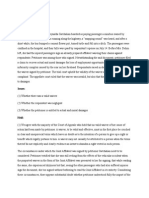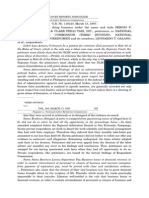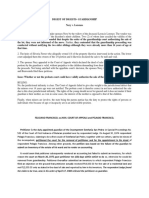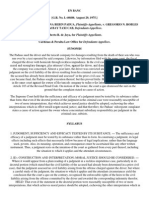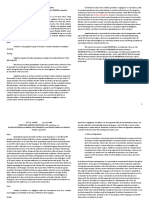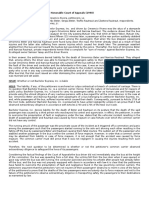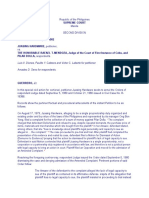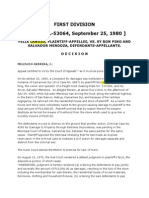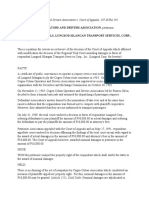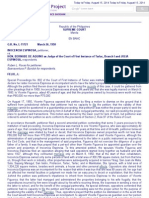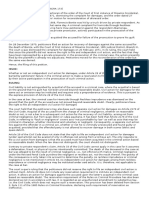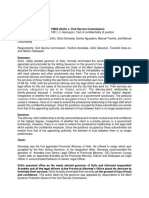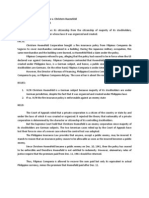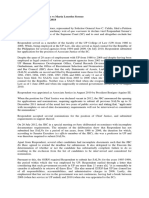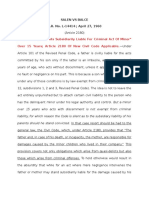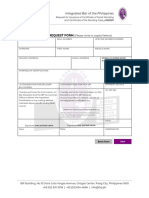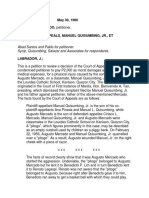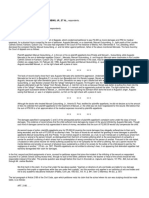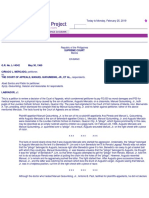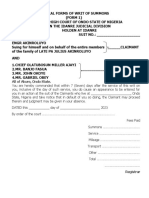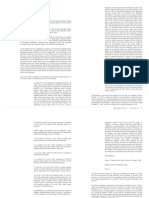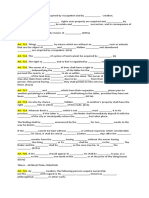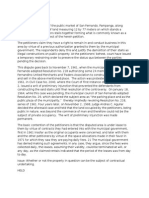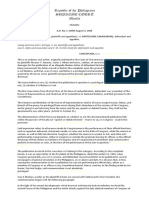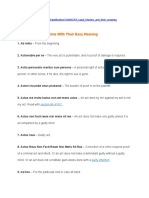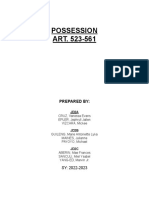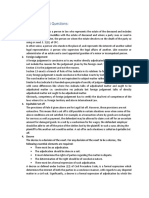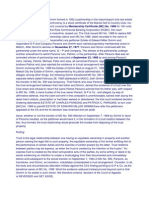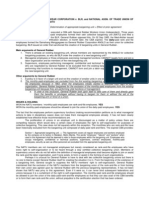Mercado vs. Ca
Mercado vs. Ca
Uploaded by
aphio_irishCopyright:
Available Formats
Mercado vs. Ca
Mercado vs. Ca
Uploaded by
aphio_irishOriginal Title
Copyright
Available Formats
Share this document
Did you find this document useful?
Is this content inappropriate?
Copyright:
Available Formats
Mercado vs. Ca
Mercado vs. Ca
Uploaded by
aphio_irishCopyright:
Available Formats
G.R. No. L-14342 CIRIACO L. MERCADO, petitioner, vs. THE COURT OF APPEALS, MANUEL QUISUMBING, JR., ET AL., respondents.
Abad Santos and Pablo for petitioner. Sycip, Quisumbing, Salazar and Associates for respondents. Labrador, J.: This is a petition to review a decision of the Court of Appeals, which condemned petitioner to pay P2,000 as moral damages and P50 for medical expenses, for a physical injury caused by the son of petitioner, Augusto Mercado, on a classmate, Manuel Quisumbing, Jr., both pupils of the Lourdes Catholic School, Kanlaon, Quezon City. The case had originated in the Court of First Instance of Manila, Hon. Bienvenido A. Tan, presiding, which dismissed the complaint filed by Manuel Quisumbing, Jr. and his father against petitioner, father of the above-mentioned Mercado. The facts found by the Court of Appeals are as follows: Plaintiff-appellant Manuel Quisumbing, Jr. is the son of his co-plaintiff-appellants Ana Pineda and Manuel L. Quisumbing, while Augusto Mercado is the son of defendant-appellee Ciriaco L. Mercado, Manuel Quisumbing, Jr. and Augusto Mercado were classmates in the Lourdes Catholic School on Kanlaon, Quezon City. A "pitogo", which figures prominently in this case, may be described as an empty nutshell used by children as a piggy bank. On February 22, 1956, Augusto Mercado and Manuel Quisumbing, Jr. quarrelled over a "pitogo". As a result, Augusto wounded Manuel, Jr. on the right cheek with a piece of razor. xxxxxxxxx The facts of record clearly show that it was Augusto Mercado who started the aggression. Undeniably, the "pitogo" belonged to Augusto Mercado but he lent it to Benedicto P. Lim and in turn Benedicto lent it to Renato Legaspi. Renato was not aware that the "pitogo" belonged to Augusto, because right after Benedicto gave it to him, Benedicto ran away to get a basket ball with which they could play. Manuel Quisumbing, Jr. was likewise unaware that the "pitogo" belonged to Augusto. He thought it was the "pitogo" of Benedicto P. Lim, so that when Augusto attempted to get the "pitogo" from Renato, Manuel, Jr. told him not to do so because Renato was better at putting the chain into the holes of the "pitogo". However, Augusto resented Manuel, Jr.'s remark and he aggresively pushed the latter. The fight started then. After Augusto gave successive blows to Manuel, Jr., and the latter was clutching his stomach which bore the brunt of Augusto's anger, Augusto seeing that Manuel, Jr. was in a helpless position, cut him on the right check with a piece of razor. xxxxxxxxx Although the doctor who treated Manuel Quisumbing, Jr., Antonio B. Past, testified for plaintiffsappellants, he did not declare as to the amount of fees he collected from plaintiff-appellants for the treatment of Manuel, Jr. the child was not even hospitalized for the wound. We believe that the sum of P50.00 is a fair approximation of the medical expenses incurred by plaintiffs-appellants. xxxxxxxxx The damages specified in paragraphs C and D of the aforequoted portion of plaintiffs-appellant's complaint come under the class of moral damages. The evidence of record shows that the child suffered moral damages by reason of the wound inflicted by Augusto Mercado. Though such kind of damages cannot be fully appreciated in terms of money, we believe that the sum of P2,000.00 would fully compensate the child.
As second cause of action, plaintiffs-appellants pray for P5,000.00 covering the moral damages they allegedly suffered due to their son's being wounded; and the sum of P3,000.00 as attorney's fees. The facts of record do not warrant the granting of moral damages to plaintiffs-appellants Manuel Quisumbing and Ana Pineda. "In law mental anguish is restricted, as a rule, to such mental pain or suffering as arises from an injury or wrong to the person himself, as distinguished from that form of mental suffering which is the accompaniment of sympathy or sorrow for another's suffering of which arises from a contemplation of wrong committed on the person of another. Pursuant to the rule stated, a husband or wife cannot recover for mental suffering caused by his or her sympathy for the other's suffering. Nor can a parent recover for mental distress and anxiety on account of physical injury sustained by a child or for anxiety for the safety of his child placed in peril by the negligence of another." (15 Am. Jur. 597). Plaintiffs-appellants are not entitled to attorney's fees, it not appearing that defendant-appellee had wantonly disregarded their claim for damages. In the first, second and third assignments of error, counsel for petitioner argues that since the incident of the inflicting of the wound on respondent occurred in a Catholic School (during recess time), through no fault of the father, petitioner herein, the teacher or head of the school should be held responsible instead of the latter. This precise question was brought before this Court in Exconde vs. Capuno and Capuno, 101 Phil. 843, but we held, through Mr. Justice Bautista: We find merit in this claim. It is true that under the law above-quoted, "teachers or directors of arts and trades are liable for any damage caused by their pupils or apprentices while they are under their custody", but this provision only applies to an institution of arts and trades and not to any academic educational institution (Padilla, Civil Law, 1953 Ed., Vol. IV, p. 841; See 12 Manresa, 4th Ed., p. 557) The last paragraph of Article 2180 of the Civil Code, upon which petitioner rests his claim that the school where his son was studying should be made liable, is as follows: ART. 2180. . . . Lastly, teachers or heads of establishments of arts and trades shall be liable for damages caused by their pupils and students or apprentices, so long as they remain in their custody. It would be seem that the clause "so long as they remain in their custody," contemplates a situation where the pupil lives and boards with the teacher, such that the control, direction and influence on the pupil supersedes those of the parents. In these circumstances the control or influence over the conduct and actions of the pupil would pass from the father and mother to the teacher; and so would the responsibility for the torts of the pupil. Such a situation does not appear in the case at bar; the pupils appear to go to school during school hours and go back to their homes with their parents after school is over. The situation contemplated in the last paragraph of Article 2180 does not apply, nor does paragraph 2 of said article, which makes father or mother responsible for the damages caused by their minor children. The claim of petitioner that responsibility should pass to the school must, therefore, be held to be without merit. We next come to the claim of petitioner that the moral damages fixed at P2,000 are excessive. We note that the wound caused to respondent was inflicted in the course of an ordinary or common fight between boys in a grade school. The Court of Appeals fixed the medical expenses incurred in treating and curing the wound at P50. Said court stated that the wound did not even require hospitalization. Neither was Mercado found guilty of any offense nor the scar in Quisumbing's face pronounced to have caused a deformity, unlike the case of Araneta, et al. vs. Arreglado, et al., 104 Phil. 529; 55 O.G. (9) 1561. Petitioner's counsel argues that if death call for P3,000 to P6,000, certainly the incised wound could cause mental pain and suffering to the tune of P2,000. In the decision of the Court of Appeals, said court pronounces that the child Quisumbing suffered moral damages "by reason of the wound inflicted by Augusto Mercado." While moral damages included physical suffering, which must have been caused to the wounded boy Quisumbing (Art. 2217, Civil Code), the decision of the court below does not declare that any of the cases specified
in Article 2219 of the Civil Code in which moral damages may be recovered, has attended or occasioned the physical injury. The only possible circumstance in the case at bar in which moral damages are recoverable would be if a criminal offense or a quasi-delict has been committed. It does not appear that a criminal action for physical injuries was ever presented. The offender, Augusto Mercado, was nine years old and it does not appear that he had acted with discernment when he inflicted the physical injuries on Manuel Quisumbing, Jr. It is possible that the Court of Appeals may have considered Augusto Mercado responsible for or guilty, of a quasi-delict causing physical injuries, within the meaning of paragraph 2 of Article 2219. Even if we assume that said court considered Mercado guilty of a quasi-delict when it imposed the moral damages, yet the facts found by said court indicate that Augusto's resentment, which motivated the assault, was occasioned by the fact that Manuel, Jr. had tried to intervene in or interfere with the attempt of Mercado to get "his pitogo from Renato." This is, according to the decision appealed from, the reason why Mercado was incensed and pushed Quisumbing who, in turn, also pushed Mercado. It is, therefore, apparent that the proximate cause of the injury caused to Quisumbing was Quisumbing's own fault or negligence for having interfered with Mercado while trying to get the pitogo from another boy. (Art. 2179, Civil Code.) After considering all the facts as found by the Court of Appeals, we find that none of the cases mentioned in Article 2219 of the Civil Code, which authorizes the grant of moral damages, was shown to have existed. Consequently, the grant of moral damages is not justified. For the foregoing considerations, the decision appealed from is hereby reversed and the petitioner is declared exempt or free from the payment of moral damages. The award of P50 for medical expenses, however, is hereby affirmed. Without costs.
You might also like
- Legal FormsDocument33 pagesLegal Formsabogado101No ratings yet
- Code of Professional Responsibility: Lawyer's OathDocument10 pagesCode of Professional Responsibility: Lawyer's OathEmil BarengNo ratings yet
- 1 SMMA Contract ExampleDocument5 pages1 SMMA Contract ExampleJulian Moncet100% (2)
- G.R. No. 192105 - Locsin Vs MekeniDocument3 pagesG.R. No. 192105 - Locsin Vs MekeniSarah Jade Layug100% (2)
- Chillicothe Police Reports For December 17th 2013Document32 pagesChillicothe Police Reports For December 17th 2013Andrew AB BurgoonNo ratings yet
- John Cartwright, Stefan Vogenauer, Simon Whittaker - Reforming the French Law of Obligations_ Comparative Reflections on the Avant-Projet De Reforme Du Droit Des Obligations Et De La Prescription, ('the Avant-projet ... Institu.pdfDocument951 pagesJohn Cartwright, Stefan Vogenauer, Simon Whittaker - Reforming the French Law of Obligations_ Comparative Reflections on the Avant-Projet De Reforme Du Droit Des Obligations Et De La Prescription, ('the Avant-projet ... Institu.pdfGichin FunakoshiNo ratings yet
- Lease Contract - SampleDocument3 pagesLease Contract - SampleJake Bryson DancelNo ratings yet
- Francisco Motors Corp. vs. CADocument5 pagesFrancisco Motors Corp. vs. CAColeen ReyesNo ratings yet
- 03 Unicapital V Consing JRDocument16 pages03 Unicapital V Consing JRKathNo ratings yet
- Political Law Review Albanos CompilationsDocument23 pagesPolitical Law Review Albanos CompilationsJu LanNo ratings yet
- California Clothing Inc vs. QuionesDocument2 pagesCalifornia Clothing Inc vs. QuionesKikoy IlaganNo ratings yet
- Amonoy V Sps GutierrezDocument6 pagesAmonoy V Sps GutierrezJan Igor GalinatoNo ratings yet
- People Vs ChowduryDocument14 pagesPeople Vs ChowduryEmma Ruby Aguilar-ApradoNo ratings yet
- 5) Republic Planters Bank v. Court of AppealsDocument5 pages5) Republic Planters Bank v. Court of AppealsE SantosNo ratings yet
- Petelo Vs RiveraDocument9 pagesPetelo Vs RiveraFacio BoniNo ratings yet
- St. Marys 4Document3 pagesSt. Marys 4John Roel VillaruzNo ratings yet
- LAW 408-A (Gr.3) - On Gr.8 - Ombudsman Powers and Limitations PDFDocument4 pagesLAW 408-A (Gr.3) - On Gr.8 - Ombudsman Powers and Limitations PDFgretyltNo ratings yet
- Rule 102Document33 pagesRule 102Joel Mendoza100% (1)
- Declaration of Presumptive DeathDocument5 pagesDeclaration of Presumptive DeathYoan Baclig BuenoNo ratings yet
- Cayetano vs. MonsodDocument1 pageCayetano vs. MonsodPDG SantosNo ratings yet
- PP V Eduarte (DIGEST)Document1 pagePP V Eduarte (DIGEST)Camella AgatepNo ratings yet
- Quimiguing V Icao PDFDocument2 pagesQuimiguing V Icao PDFpaolo ricaforteNo ratings yet
- Loloy Unduran, Et Al. v. Ramon Aberasturi, Et Al.Document2 pagesLoloy Unduran, Et Al. v. Ramon Aberasturi, Et Al.hannahNo ratings yet
- North Sea Continental Shelf Cases Germany v. Denmark - HollandDocument2 pagesNorth Sea Continental Shelf Cases Germany v. Denmark - HollandSecret SecretNo ratings yet
- Roxas Vs CA - G.R. No. 139337. August 15, 2001Document10 pagesRoxas Vs CA - G.R. No. 139337. August 15, 2001Ebbe Dy100% (1)
- United States vs. Fowler, G.R. No. L-496, Dec. 31, 1902 (Jurisdiction)Document2 pagesUnited States vs. Fowler, G.R. No. L-496, Dec. 31, 1902 (Jurisdiction)Marilie TubalinalNo ratings yet
- Consolidated Digests - Civil Law (Atty Dicdican)Document210 pagesConsolidated Digests - Civil Law (Atty Dicdican)Reah Crezz100% (1)
- Rakes Vs The Atlantic Gulf and Pacific CompanyDocument2 pagesRakes Vs The Atlantic Gulf and Pacific CompanyCharLene MaRieNo ratings yet
- Custodio vs. Court of Appeals: G.R. No. 116100. February 9, 1996 DoctrineDocument2 pagesCustodio vs. Court of Appeals: G.R. No. 116100. February 9, 1996 DoctrineStephen Celoso EscartinNo ratings yet
- G.R. No. 159813 August 9, 2006 Tony N. Figueroa and Rogelio J. Flaviano, Petitioners, The People of The Philippines, RespondentDocument4 pagesG.R. No. 159813 August 9, 2006 Tony N. Figueroa and Rogelio J. Flaviano, Petitioners, The People of The Philippines, RespondentShiela VenturaNo ratings yet
- Chavez v. GonzalesDocument1 pageChavez v. GonzalesKEVIN W ANGLONo ratings yet
- Gatchalian V DELIMDocument3 pagesGatchalian V DELIMJS DSNo ratings yet
- Converse Rubber Vs Jacinto RubberDocument15 pagesConverse Rubber Vs Jacinto RubberClaudine Christine A VicenteNo ratings yet
- Ra 7610Document12 pagesRa 7610Mae ReyesNo ratings yet
- 8A Ong Vs CADocument14 pages8A Ong Vs CASiobhan Robin100% (1)
- Naguiat V NLRCDocument17 pagesNaguiat V NLRCnia_artemis3414No ratings yet
- Bricktown Dev't. Corp. vs. Amor Tierra Dev't. CorpDocument1 pageBricktown Dev't. Corp. vs. Amor Tierra Dev't. Corpalfred chuaNo ratings yet
- SP GuardianshipDocument23 pagesSP GuardianshipDia Mia BondiNo ratings yet
- PAULINO PADUA, ET AL. v. GREGORIO N. ROBLES, ET AL. G.R. No. L-40486 August 29, 1975 PDFDocument9 pagesPAULINO PADUA, ET AL. v. GREGORIO N. ROBLES, ET AL. G.R. No. L-40486 August 29, 1975 PDFIvan Angelo ApostolNo ratings yet
- Ruling:: Reckless ImprudenceDocument12 pagesRuling:: Reckless ImprudenceSab RinaNo ratings yet
- Bachelor Express, Incorporated vs. The Honorable Court of Appeals (1990)Document1 pageBachelor Express, Incorporated vs. The Honorable Court of Appeals (1990)Teff QuibodNo ratings yet
- Juasing Hardware V MendozaDocument5 pagesJuasing Hardware V MendozaOmeglieNo ratings yet
- Lanuzo Vs PingDocument4 pagesLanuzo Vs Pingangelsu04No ratings yet
- Cogeo-Cubao Operators and Drivers Association v. Court of Appeals, 207 SCRA 343Document2 pagesCogeo-Cubao Operators and Drivers Association v. Court of Appeals, 207 SCRA 343Jazzy AlimNo ratings yet
- Sps Hernandez Vs Sps DolorDocument7 pagesSps Hernandez Vs Sps DolorMack Hale BunaganNo ratings yet
- Torts Case Digests General ConceptsDocument21 pagesTorts Case Digests General Conceptsmae annNo ratings yet
- Tamargo Vs Court of Appeals Et AlDocument5 pagesTamargo Vs Court of Appeals Et Alandrea ibanezNo ratings yet
- Baldoza V Dimaano DigestDocument2 pagesBaldoza V Dimaano Digestyukibambam_28No ratings yet
- 06 Regino v. Pangasinan Colleges of Science and Technology, G.R. No.156109, November 18, 2004Document9 pages06 Regino v. Pangasinan Colleges of Science and Technology, G.R. No.156109, November 18, 2004Anonymous geq9k8oQyONo ratings yet
- Espinosa vs. AquinoDocument3 pagesEspinosa vs. AquinoJosine ProtasioNo ratings yet
- Bonite VsDocument2 pagesBonite VsAnonymous MmbSn3No ratings yet
- Griño V CSCDocument4 pagesGriño V CSCshaneena kumarNo ratings yet
- Insurance CasesDocument12 pagesInsurance CasesMohammad AlianNo ratings yet
- Republic of The Philippines Vs Maria Lourdes SerenoDocument14 pagesRepublic of The Philippines Vs Maria Lourdes SerenoFJ NarraNo ratings yet
- 09 Macalinao v. BPIDocument1 page09 Macalinao v. BPIGracey CasianoNo ratings yet
- Pacific Rehouse Corp. v. CADocument2 pagesPacific Rehouse Corp. v. CAcmtbulacanNo ratings yet
- Salen Vs BalceDocument4 pagesSalen Vs BalceSarah De GuzmanNo ratings yet
- L. Batlin & Son, Inc. v. Jeffrey Snyder D/B/A J. S. N. Y. and Etna Products Co., Inc., 536 F.2d 486, 2d Cir. (1976)Document11 pagesL. Batlin & Son, Inc. v. Jeffrey Snyder D/B/A J. S. N. Y. and Etna Products Co., Inc., 536 F.2d 486, 2d Cir. (1976)Scribd Government DocsNo ratings yet
- Case 3 - ManliguezDocument4 pagesCase 3 - ManliguezCharmaigne LaoNo ratings yet
- UBFHA V S BF HomesDocument11 pagesUBFHA V S BF HomesMonique LhuillierNo ratings yet
- IBP Certification Request FormDocument1 pageIBP Certification Request FormFlorenz Ross Mosquera100% (1)
- Mercado V CA - FulltextDocument5 pagesMercado V CA - FulltextNylaNo ratings yet
- Negotiable Instrument CasesDocument7 pagesNegotiable Instrument CasesJm DabalNo ratings yet
- Mercado Vs CADocument3 pagesMercado Vs CAhazeNo ratings yet
- Study Guide:: Reformation of InstrumentsDocument6 pagesStudy Guide:: Reformation of InstrumentsKelsey De GuzmanNo ratings yet
- Akinroluyo Writ of SummonsDocument17 pagesAkinroluyo Writ of SummonsNelson AkinroluyoNo ratings yet
- Informal Trading FAQs PDFDocument12 pagesInformal Trading FAQs PDFcymNo ratings yet
- Court of Appeal For OntarioDocument35 pagesCourt of Appeal For Ontariorichard_warman0% (1)
- Ra 10882Document3 pagesRa 10882calzoerwinNo ratings yet
- Labor Law-Ii Project On: "Provisions Relating To Hazardous Process in Factory Act"Document6 pagesLabor Law-Ii Project On: "Provisions Relating To Hazardous Process in Factory Act"Mohd AazamNo ratings yet
- 62 - People Vs FelanDocument3 pages62 - People Vs FelanDazzle DuterteNo ratings yet
- Macariola V AsuncionDocument9 pagesMacariola V AsuncionEm-em BrionesNo ratings yet
- 1 Rule 103Document2 pages1 Rule 103Ezra Denise Lubong RamelNo ratings yet
- Quiz 7Document5 pagesQuiz 7Vanessa Evans CruzNo ratings yet
- DPA Gearbulk INTERMARINE 2023 v.FINALDocument9 pagesDPA Gearbulk INTERMARINE 2023 v.FINALAmanda LobatoNo ratings yet
- III B People Vs Pugay DDocument2 pagesIII B People Vs Pugay DMargo GreenNo ratings yet
- SGLGB EO No. 19 BESRTDocument1 pageSGLGB EO No. 19 BESRTDonavel Nodora Jojuico100% (6)
- Jurip Ravi PDFDocument15 pagesJurip Ravi PDFravi aryaNo ratings yet
- Property Digested CasesDocument6 pagesProperty Digested CasesAngie DouglasNo ratings yet
- Annex 3 Judicial Affidavit of Ms. Michelle EgargoDocument3 pagesAnnex 3 Judicial Affidavit of Ms. Michelle Egargojheanniver nabloNo ratings yet
- US Embassy PamphletDocument12 pagesUS Embassy PamphletKennethAdrianRosaNo ratings yet
- Jimenez Vs CabangbangDocument3 pagesJimenez Vs CabangbangMingNo ratings yet
- Legal Maxims 2Document16 pagesLegal Maxims 2Megha GargNo ratings yet
- PossessionDocument39 pagesPossessionLoNo ratings yet
- Acknowledgment Receipt: Loan Account Number: 4202701529Document3 pagesAcknowledgment Receipt: Loan Account Number: 4202701529Kristine TabayNo ratings yet
- Very Short Important QuestionsDocument17 pagesVery Short Important QuestionsJatinKalraNo ratings yet
- Proc - Ofgoods - Sealed - Quotation Final Re-June-2019Document33 pagesProc - Ofgoods - Sealed - Quotation Final Re-June-2019Serve Engineering SolutionsNo ratings yet
- GRMM vs. ParsonsDocument1 pageGRMM vs. ParsonsAyzel PalmeroNo ratings yet
- Natural and Effect of ObligationsDocument8 pagesNatural and Effect of ObligationsMaurren SalidoNo ratings yet
- General Rubber and Footwear Corporation v. BLRDocument1 pageGeneral Rubber and Footwear Corporation v. BLRtemporiariNo ratings yet
